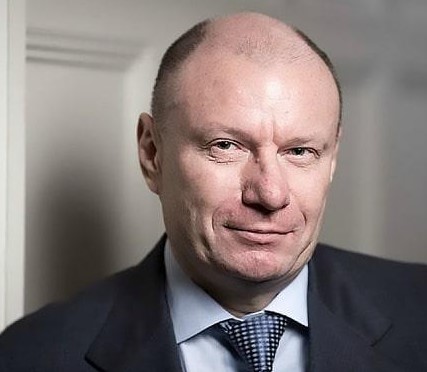Potanin said that Russia has a "vaccination of 1917" against the seizure of assets

The West is trying to provoke: “Here we will illegally take away your property, and you will take it away, and we will be quits,” but this is not the way to do it, the businessman believes.Potanin also objects to the nationalization of foreign assets in RussiaVladimir PotaninVladimir PotaninVladimir PotaninVladimir PotaninVladimir Potanin
Russia has been vaccinated against asset confiscation since 1917, one of Russia's richest businessmen Vladimir Potanin (ranked second in the Forbes ranking of the country's richest businessmen) said in an interview with RBC TV in response to a question about the West's plans to seize Russian assets and proposals nationalize the property of foreign companies that left Russia.
The businessman called the confiscation "a covert or overt form of theft" that destroys the investment climate where such decisions are made. Western countries, which have built their society on the principle of respect for private property, are destroying it and doing it in vain: such an approach will eventually hit them themselves.
Vladimir Potanin - RBC: "There is no need for confiscations,no need for nationalization” Business
“We don’t need to repeat this. Why repeat the mistakes of others? We must learn from the mistakes of others. Moreover, we already received our vaccination in 1917. And everyone remembers what it led to. Therefore, we just need to remember what the vaccination against disrespect for people's personal freedoms and the right to property has led to, so we will say collectively, to bad consequences. And therefore, you just need to be able to refrain from this, ”Potanin believes.
In the actions of the West, Potanin sees a provocation: “here we will illegally take away your property, and you take it away, and we will be quits,” but you shouldn’t do that. “Firstly, because we will then fight for this property of ours. And the absence of violations on our part of the rules, the generally accepted rules for handling property gives us a great at least moral and psychological advantage, if not some legal arguments. And secondly, it is harmful inside. And I'll tell you why. Because entrepreneurial activity is built on respect for the right to property, people's motivation is built. And depriving them of that kind of motivation is a very harmful thing,” he explained.
Brussels supported Estonia's plans to start confiscation of Russia's assets Politics
Potanin also objects to the nationalization of property. “If some companies leave our country, then instead of applying some kind of confiscation and other harsh measures to them, it is much easier to give the investment community the opportunity to resolve this problem on its own. For this, he has every opportunity to replace foreign investments with domestic ones,” he believes. Moreover, the “panic exodus or exodus of foreign companies” from the country has led to the fact that they can be purchased by domestic investors on very attractive terms.
Read on RBC Pro 11 competencies that will help women overcome the "glass ceiling" Business relocation to the UK: what surprises to prepare for Unknown investors are buying up gold reserves. What's Happening in the Market The Anatomy of a Lie and the Lessons of Don Corleone: 6 Books from Co-Founder Mr.
The Russian economy is more likely to suffer from excessive state participation in it, so nationalization, in his opinion, "goes against the whole financial and economic policy" of the government. "Procreate" state property would be superfluous, he is convinced. “Now let’s nationalize something, I don’t know, in Yandex, Tinkoff or HeadHunter. I am even sure that your audience will fully perceive my concerns about this kind of approach. Therefore, there is no need for confiscations, no need for nationalization. It is necessary to develop the investment climate and replace some investments with others - domestic and from friendly countries, ”concluded the businessman.
At the end of October, President Vladimir Putin , at a meeting of the Valdai International Discussion Club, said that there was no need for nationalization. According to him, "people of communist convictions" believe that "everything should be nationalized again, everything should be 'statized'". “How effective it is is hard to say. In some way and somewhere, in some specific historical situation, we also do not refuse this, we even have a law on nationalization. But we don't do that," he said. United Russia proposed to nationalize the property of foreign companies that left Russia. State Duma Speaker Vyacheslav Volodin suggested seizing property in Russia from businesses from unfriendly countries in the event of confiscation of frozen Russian assets.
At the end of December, Potanin, as well as Interros and Rosbank (he acquired it in the spring from the French group Societe Generale, who left Russia), fell under US sanctions . Since the summer of 2022, the businessman has been under UK sanctions as the controlling owner of Rosbank. In the fall, Interros transferred 47.5% of the shares of Rosbank to the Potanin Charitable Foundation.
Norilsk Nickel did not fall under US restrictions, since the company, according to the country's Ministry of Finance, is not controlled by a businessman or other sanctioned persons. Interros owns 36.14% of Norilsk Nickel.
In March 2022, Potanin had already stated that the confiscation of foreign assets in Russia would return it "a hundred years ago, to 1917", and the consequences of this step would be "global distrust" in the country on the part of investors for decades. At the same time, he called the proposal to introduce external management at the enterprises of companies that left the country an adequate measure.




























































